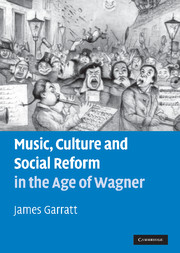Book contents
- Frontmatter
- Contents
- Acknowledgments
- Abbreviations
- Introduction
- 1 Liberalism, autonomy and the social functions of art
- 2 Radical and social aesthetics in the Vormärz
- 3 Speaking for the Volk: music, politics and Vormärz festivals
- 4 Revolutionary voices: blueprints for an aesthetic state
- 5 Music and the politics of post-revolutionary culture
- 6 The song of the workers: idylls and activism
- Notes
- Bibliography
- Index
Introduction
Published online by Cambridge University Press: 05 July 2011
- Frontmatter
- Contents
- Acknowledgments
- Abbreviations
- Introduction
- 1 Liberalism, autonomy and the social functions of art
- 2 Radical and social aesthetics in the Vormärz
- 3 Speaking for the Volk: music, politics and Vormärz festivals
- 4 Revolutionary voices: blueprints for an aesthetic state
- 5 Music and the politics of post-revolutionary culture
- 6 The song of the workers: idylls and activism
- Notes
- Bibliography
- Index
Summary
Why did Richard Wagner and other nineteenth-century musicians devote so much attention to social reform, if the dominant artistic principle of the age demanded art's detachment from social and political concerns? This question, and persistent frustration with the standard answers to it, is what led to this book. The issue at stake is crucial to our received view of nineteenth-century German music, culture and aesthetics: the assumption that musicians and other artists – as a result of the idea of aesthetic autonomy – regarded the artistic sphere as polarized from the social and political fields, indeed that art's freedom demanded such polarization. This viewpoint, I argue, not only misunderstands aesthetic autonomy, but drastically exaggerates its authority over musical thought and culture. In order to understand the social meanings and functions of music in this period, therefore, we need to overhaul our picture of how artistic and social imperatives interacted. Far from governing nineteenth-century musical discourse and practice, the concept of aesthetic autonomy and the aesthetic categories bequeathed by Weimar classicism were persistently challenged by alternative models of music's social role. The book explores these competing models and the socio-political projects that gave rise to them. It interrogates nineteenth-century musical discourse, exploring numerous manifestos championing musical democratization or seeking to make music an engine for the transformation of society. In addition, it explores institutions and movements that attempted to realize these goals, and compositions – by Mendelssohn, Lortzing and Liszt as well as Wagner – in which the relation between aesthetic and social claims is programmatic.
- Type
- Chapter
- Information
- Publisher: Cambridge University PressPrint publication year: 2010



